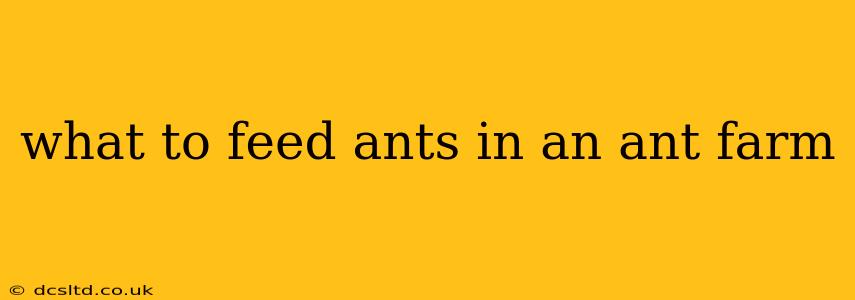Keeping an ant farm is a fascinating way to observe the intricate world of these tiny creatures. However, providing the right nutrition is crucial for their health and the longevity of your ant colony. Feeding them improperly can lead to sickness, death, and a generally unhappy ant farm experience. This guide explores the best foods to offer your ants, addressing common concerns and providing expert advice.
What Can I Feed My Ants in an Ant Farm?
The ideal ant farm diet is varied and mimics their natural food sources. Avoid sugary substances like honey or jam, as these can lead to fungal growth and harm your colony. Instead, focus on providing a balanced diet consisting of:
-
Protein: This is essential for ant growth and development. Small insects (like fruit flies or crickets, ensure they are dead before introducing them), crushed mealworms, or even a tiny bit of cooked egg yolk are excellent protein sources. Remember to provide these in moderation, as uneaten protein can mold quickly.
-
Carbohydrates: These provide energy for the ants. Good options include small pieces of fruit (like apple, orange, or banana—remove the peel and cut into tiny pieces), seeds (such as sunflower seeds, crushed), and cooked grains (like rice or oats). Again, ensure portion sizes are appropriate to prevent waste and mold.
-
Sugars (in moderation): While excessive sugar is harmful, a tiny drop of diluted honey or a small piece of a sugar cube can provide an occasional energy boost. Never overdo it, and always monitor for any signs of mold or excess waste.
What NOT to Feed Ants in an Ant Farm?
Certain foods are strictly off-limits for your ant farm inhabitants, as they can be detrimental to their health:
-
Processed Foods: Avoid anything processed, salty, or sugary. These lack the necessary nutrients and can disrupt the ants' digestive systems.
-
Citrus Fruits (Large Quantities): While small amounts of orange or lemon might be tolerated, large quantities of citrus fruits can be acidic and harmful to ants.
-
Dairy Products: Ants cannot digest dairy, so avoid offering milk or cheese.
-
Anything with Additives/Preservatives: These can be toxic to ants. Stick to natural, unprocessed foods.
-
Large Food Items: Large pieces of food can become breeding grounds for bacteria and mold and are difficult for ants to manage. Always provide small, manageable portions.
How Often Should I Feed My Ants?
Feeding frequency depends on the size of your colony and the type of ants. As a general guideline:
- Small colonies: Feed every 2-3 days.
- Large colonies: Feed every 1-2 days.
Always monitor the food supply. Remove any uneaten food to prevent mold or bacteria growth. Observe your ants' behavior. If they seem uninterested in a particular food, try something different.
What if My Ants Aren't Eating?
Several factors could be contributing to a lack of appetite:
- Incorrect Food: Try offering a different variety of food.
- Insufficient Water: Ensure the water source in your ant farm is always replenished.
- Stress: Avoid disturbing the ant farm excessively. Excessive handling can stress ants and reduce their appetite.
- Disease or Infestation: If you suspect illness, consult an expert or entomologist.
What Kind of Water Do Ants Need?
Ants require a consistent water source. A small, water-filled sponge or a cotton ball dampened with water is an appropriate choice; make sure it is not sitting in a puddle that could drown the ants. Avoid putting direct water drops into the farm; it may flood the tunnels.
Can I Give My Ants Honey?
While a tiny drop of diluted honey can be offered very occasionally as a treat, it's generally best avoided. Honey is high in sugar and can promote the growth of harmful molds and bacteria within the ant farm. It's far better to stick to the nutrient-rich, natural foods listed above.
Can I Feed My Ants Sugar?
Similar to honey, sugar should be given sparingly, if at all. Excessive sugar can negatively impact the health of your ant colony. A tiny grain or two of sugar can be used for an occasional treat but should not form a significant part of their diet.
By following these guidelines and providing a balanced, natural diet, you'll ensure a thriving and healthy ant colony in your ant farm for years to come. Remember, careful observation and a commitment to providing a safe and clean environment are crucial to their well-being.
